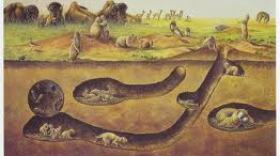On this installment of our show, an interesting and provocative discussion with Fred Pearce, an award-winning author and journalist based in London who's reported on environmental, science, and development issues all over the planet for the past twenty years. Pearce tells us about his new book, a critique of "the new ecology" entitled "The New Wild: Why Invasive Species Will Be Nature's Salvation." As he notes in this book's Introduction: "Rogue rats, predatory jellyfish, suffocating super-weeds, wild boar, snakehead fish wriggling across the land -- alien species are taking over. Nature's vagabonds, ruffians, and carpetbaggers are headed for an ecosystem near you. These biological adventurers are traveling the world in ever greater numbers, hitchhiking in our luggage, hidden in cargo holds, stuck to the bottom of ships, and migrating to keep up with climate change. Today's human-dominated world of globalized trade and messed-up ecosystems is giving footloose species many more chances to cruise the planet and set up home in distant lands. Some run riot, massacring local species, trashing their new habitats, and spreading diseases. Most of us like a simple story with good guys and bad guys, and aliens always make easy enemies. So the threat of foreign species invading fragile environments and causing ecological mayhem gets our attention. Conservationists have for half a century been battling to hold back the tide of aliens. They call them the second biggest threat to nature, after habitat loss. Their concern is laudable. They want to protect native species and the ecosystems they inhabit. But do we fear these ecological outsiders too much? Most environmentalists would recoil to think this, but maybe our fear is sometimes little more than green xenophobia. Most of us are appalled when foreign humans are treated as somehow intrinsically dangerous. Yet the orthodoxy in conservation is to demonize foreign species in just that way. Native is good and alien is bad. But is this simple formula true? Or might we need the go-getter, can-do aliens? Might their success be a sign of nature’s resilience in the face of the considerable damage humans have done to the planet?" And finally, as a critic for Booklist has noted of Pearce's book: "[The author] shows that biodiversity actually increases more frequently than it decreases when newer wildlife marches in.... [This is] must reading for environmentalists of every stripe, and an optimistic report on the resilience of nature in a world of constantly shifting ecosystems."
In Favor of Alien Invaders -- "The New Wild: Why Invasive Species Will Be Nature's Salvation"








